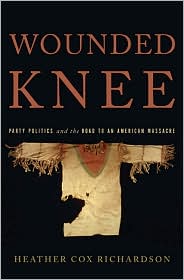Our meeting on Wednesday, July 11, discussed "Wounded Knee: Party Politics and the Road to an American Massacre" by Heather Cox Richardson. The book starts with an account of the tragedy at Wounded Knee in 1890 and devotes the next to last chapter to those events. However, the main portion of the book describes the background of the events at Wounded Knee, including the machinations of politicians and bureaucrats in Washington. The consensus quite favorable toward the book.
Sixteen members of the club came for the discussion. Much of it revolved around the poverty that continues to dog the Lakota reservation, the causes of that poverty, and the difficulties of finding ways to improve the health and welfare of the Lakota people.
Here are a couple of blog posts from a club member discussing the book:

The group continued with a new procedure in which a member briefly summarizes a second book for its members, Christian Minor presented a summary of American Colossus: The Triumph of Capitalism 1865 - 1900 by H. W. Brands. He recommended the book highly. He recommended these two sites for those wanting to learn more about the book:
- H.W. Brands Discusses `American Colossus': Lewis Lapham
- Sex Slaves Sold As Law Created Illegal Immigrants: Lewis Lapham
Barnes and Noble provides the following overview of American Colossus:
The years between the Civil War and the end of the nineteenth century saw the wholesale transformation of America from a land of small farmers and small businessmen into an industrial giant. Driven by unfathomably wealthy and powerful businessmen, armies of workers were harnessed to a new vision of massive industry. A society rooted in the soil became one based in cities.
The capitalist revolution left not a single area or aspect of American life untouched. It roared across the South, wrenching that region from its feudal past and integrating the Southern economy into the national one. It burst over the West, dictating the destruction of Native American economies and peoples, driving the exploitation of natural resources, and making the frontier of settlement a business frontier as well. It crashed across the urban landscape of the East and North, turning cities into engines of wealth and poverty, opulence and squalor. It swamped the politics of an earlier era, capturing one major party and half of the other, inspiring the creation of a third party and determining the issues over which all three waged some of the bitterest battles in American history.
American Colossus is an unforgettable portrait of the years when the contest between capitalism and democracy was at its sharpest, and capitalism triumphed.